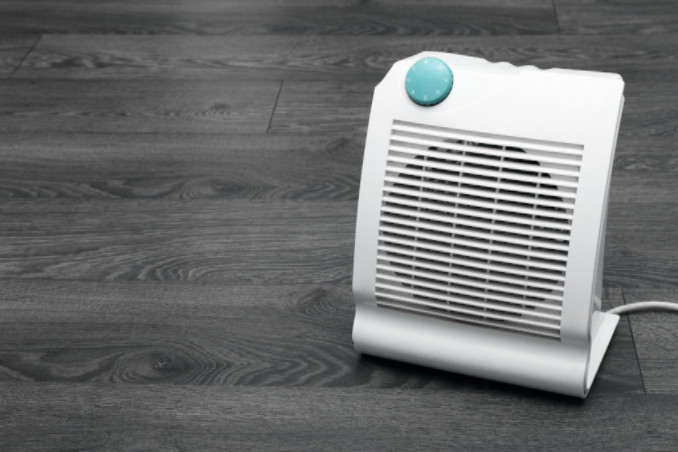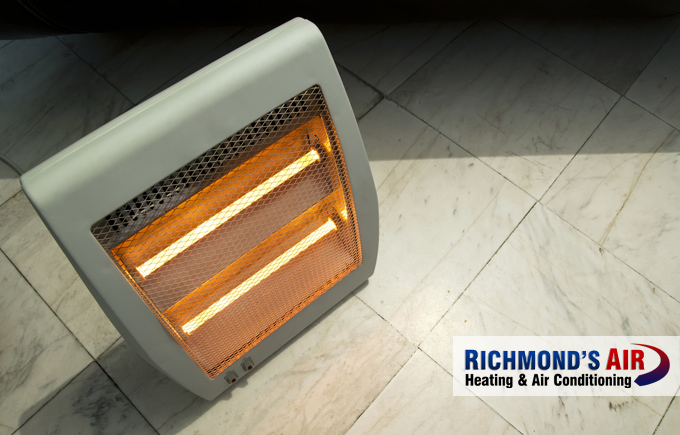Updated: October 23, 2024

As the air begins to cool, we’ll be turning up the temperature on our thermostats and pulling the space heaters out of storage to stay warm. While Texas doesn’t usually see the same falling temperatures as more northern areas of the country, you’ll still need to be prepared for wintertime.
Space heaters are a popular, affordable option for heating small spaces. They are also sometimes used to supplement existing heating systems or as a temporary fix for a heater not working, but they can also be extremely dangerous if they aren’t used properly.
According to data from the National Fire Protection Association, between 2016 and 2020, approximately 88% of heating fire deaths in homes involved space heaters. Additionally, the U.S. Consumer Product Safety Commission reports that from 2017 to 2019, approximately 1,700 house fires, 70 deaths, and 160 burn injuries were caused by portable heaters annually.
To help keep you and your family safe this winter, we’ve come up with a list of important do’s and don’ts when operating a space heater in your home.
Space heater do’s:
- Do use a space heater that has been tested and certified by up-to-date safety standards. Most new heaters have the necessary safety certification, but be careful when you purchase or use an older heater.
- Do invest in a quality space heater. Lots of models come with safety features. For example, some models have the ability to shut off automatically if they’re overheated or if a person or object comes too close.
- Do keep at least 3 feet of space around the heater at all times to avoid a fire. This includes furniture, drapery, and clothing.
- Do use wall plug-ins rather than extension cords or outlet strips.
- Do unplug the unit every time you leave the room.
- Do make sure you have an active smoke alarm in every room where you’re using a space heater.
- Do pick the appropriate size heater for the space you need to heat. Never put too powerful of a heater in too small of a room. Also, avoid using one that is too small because it will constantly run.
Space heater don’ts:
- Don’t place your space heater in a room with excessive dampness. For example, avoid placing a space heater in a bathroom.
- Don’t use your space heater while you’re out of the room or while sleeping.
- Don’t place your space heater on any furniture or carpet. Space heaters should always be placed on a hard, flat surface.
- Don’t mix the chemicals needed to power the heater. While many space heaters run on electricity, others use kerosene or propane. It’s important never to use gasoline in a heater designed for use with another fuel, like kerosene. This can increase the chance of fire.
- Don’t use gasoline-powered space heaters inside a house due to the significant risk of fire and the emission of dangerous fumes, including carbon monoxide, which can be lethal in enclosed spaces.
- Don’t use a space heater around small children unless they have constant supervision.
Houston, what temperature do you turn your heater on when sleeping?
In Houston, where temperatures can fluctuate dramatically, the question of when to turn on the heater for a comfortable night’s sleep sparks diverse opinions.
FAQs about space heaters
Is it better to put a space heater on the floor or up high?
It’s generally better to place a space heater on the floor rather than up high. Since heat rises, positioning the heater on the floor allows for more efficient and even heating of a room. Floors, especially those that are uninsulated or have cold surfaces, can absorb heat and help distribute it more evenly throughout the space.
Additionally, placing a heater on the floor reduces the risk of it being knocked over or causing a fire hazard. However, it’s important to keep the heater away from foot traffic and flammable materials, regardless of its placement.
Can a space heater be on carpet?
Ideally, a space heater should not be placed on carpet. The primary concern is that carpets are flammable materials, and a space heater, especially one that gets very hot or is not well-designed, can pose a fire risk if it overheats.
Modern space heaters are typically designed with safety features like automatic shutoff mechanisms to prevent overheating, making them safer to use on carpet. Nonetheless, it’s essential to use a space heater that is stable and won’t tip over easily, and always follow the manufacturer’s instructions and safety guidelines.
Where should you not put a space heater?
In addition to carpets or rugs, you should avoid placing a space heater in any of these locations to ensure safety and efficiency:
- Near flammable materials. Keep space heaters away from furniture, curtains, bedding, clothing, rugs, and any other items that can catch fire.
- In wet or damp areas. Unless the heater is specifically designed for bathrooms or outdoor use, avoid placing it in areas where it might come into contact with water to prevent electric shock.
- In high-traffic areas. Avoid putting a space heater in places where people or pets frequently pass to reduce the risk of it being knocked over.
- In confined spaces. Do not place space heaters in small, enclosed spaces where the risk of overheating and fire is higher.
- Near children and pets. Keep space heaters out of reach to avoid accidental burns or the heater being tipped over.
- On top of furniture. Placing heaters on furniture increases the risk of overheating and fire, especially if the furniture is flammable.
Top heating mistakes Houston homeowners make in the winter
Save money and increase the comfort of your home by avoiding these 9 common heating mistakes.
Is it OK to leave a space heater on all night?
Leaving a space heater on all night is generally not recommended due to the increased risk of fire and the potential for carbon monoxide poisoning with some types of heaters. Even with modern safety features, such as automatic shutoff and overheat protection, there is still a risk when a heater is left unattended for extended periods.
It’s better to use the heater to warm up your room before bed and then turn it off, relying on blankets or a more permanent heating system for the rest of the night.
If you must use a space heater throughout the night, ensure it’s far from flammable materials, in good working condition, and has advanced safety features. Consider using a thermostat-controlled heater designed for safe overnight use.
Can you plug a space heater into an extension cord?
It’s generally not recommended to plug a space heater into an extension cord or power strip. This is because space heaters draw a significant amount of electricity, and many extension cords and power strips are not designed to handle the high current required by these heaters.
This mismatch can lead to overheating of the cord or strip, posing a serious fire risk.
Instead, it’s safer to plug a space heater directly into a wall outlet that can adequately handle the power load. If you absolutely need to use an extension cord, ensure it’s a heavy-duty type that’s rated for the heater’s power requirements, though directly plugging into a wall outlet remains the safest option.
How hot can a space heater make a room?
The extent to which a space heater can warm a room depends on several factors, including the heater’s power (typically measured in watts), the size and insulation quality of the room, and the ambient temperature.
Most residential space heaters range in power from 750 to 1,500 watts and are designed to warm small to medium-sized rooms. A general rule of thumb is that a space heater can increase room temperature by 10 to 15 degrees Fahrenheit in a well-insulated room, but the actual performance can vary widely.
For example, a 1,500-watt heater can adequately heat about 150 square feet of well-insulated space. However, in a poorly insulated room or with extremely low outdoor temperatures, the heater may not increase the room temperature as effectively.
Additionally, the heater’s efficiency can be affected by factors like the presence of drafts, ceiling height, and the room’s layout.
How long since your heating unit was last checked?
Don’t get stuck out in the cold!
At Richmond’s Air, we’ve been doing heating and furnace repairs right since 2002. Our work is 100% guaranteed by a 1-year parts and labor warranty on repairs.
Ready to upgrade your old cooling and heating system in Houston?
If you’re looking for a new solution for your heating and cooling needs, contact the experts at Richmond’s Air to learn more about the services we offer and how we can help heat your home this winter. We have a variety of heating options that can accommodate almost any budget, so give us a call to set up an appointment today.
We proudly serve the communities of Houston, Katy, Spring and surrounding areas.
 Read reviews
Read reviews










